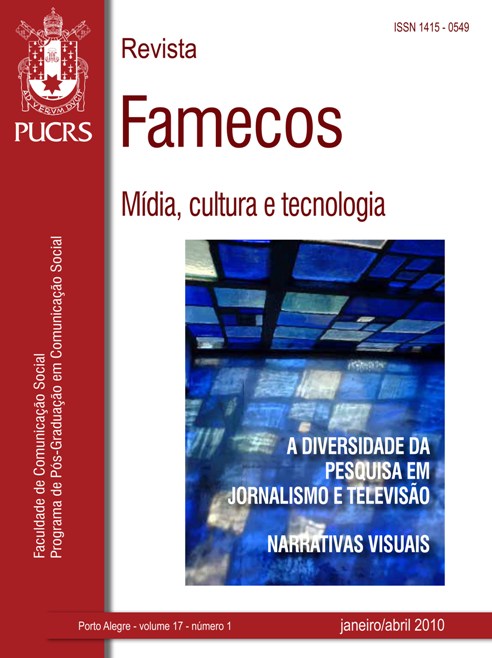Proactive subjects, autonomy and new technologies: challenges in the construction of the human in postmodernity
DOI:
https://doi.org/10.15448/1980-3729.2010.1.6885Keywords:
Autonomy, new technologies, human resources managementAbstract
The social, economical and technological reality of the society we live in imposes new ways of living and perceiving the world and brings a new conception of humanity. The proactive subjects, alone in their search, develop a stronger feeling of being misunderstood in a time when their actions are converted into megabits, facilitating the exchange of thoughts and ideas. Understanding the implications of the technological imaginary existing at the present time and perceiving its promises of autonomy enable us to observe the setting of a scenario that some authors refer to as post-modernity. Such scenario poses challenges to marketing professionals and human resources managers within a competitive society. In order to discuss these issues, this text presents some theoretical assumptions that might move forward the debates about the development of a more fair and democratic society.Downloads
References
ARENDT, Hannah. A condição humana. 10. ed. São Paulo: Forense Universitária, 2003.
BAUDRILLARD, Jean. Simulacros e Simulação. Trad. Maria João da Costa Pereira. Lisboa: Relógio d´Água, 1991. 205p.
BAUMANN, Zygmunt. O mal-estar da pós-modernidade. Rio de Janeiro: Jorge Zahar Editora, 1998. 272p.
BETH, Hanno; PROSS, Harry. Introducción a la ciência de la comunicación. Barcelona: Anthropos, 1990.
BLASS, Leila Maria da Silva. Nas interfaces do trabalho, emprego e lazer. In: XXVII ANPOCS, 2003, Caxambu. Anais do XXVII Encontro Anual da ANPOCS. Caxambu, Minas Gerais, 2003.
CANCLINI, Néstor García. Consumidores e Cidadãos: conflitos multiculturais da globalização. Rio de Janeiro: UFRJ, 1995. 226p.
______. Culturas híbridas: estratégias para entrar e sair da modernidade. 2. ed. São Paulo: EDUSP, 1998. 387p.
CASTELLS, Manuel. A sociedade em rede: economia, sociedade e cultura. São Paulo: Paz e Terra, 1999. 618p.
DESSLER, Gary. Administração de recursos humanos. São Paulo: Prentice Hall, 2003.
DIEZ, Fernando. El discurso del trabajo en el siglo de las luces. Sociología del trabajo. Madrid, n. 42, p. 119-144, Primavera 2001.
DUTRA, Joel Souza. Gestão de pessoas: modelo, processos, tendências, perspectivas. São Paulo: Atlas, 2002.
FERREIRA. Daniela Assis Alves. Tecnologia: fator determinante no advento da sociedade da informação. Perspectiva da Informação. Belo Horizonte, v. 8, n.1, p. 4-11, jan./ jun. 2003.
FLEUTY, Maria Tereza (Coord.). As pessoas na organização. São Paulo: Editora Gente, 2002.
GARDER, Howard; KORNHABER, Mindy; WAKE, Warren K. Inteligência: múltiplas perspectivas. Porto Alegre: ARTMED, 1998.
GIL, Antônio Carlos. Gestão de pessoas: enfoque nos papéis profissionais. São Paulo: Atlas, 2001.
HARDT, Michael; NEGRI, Antonio. Império. Tradução de Berilo Vargas 3. ed. Rio de Janeiro; São Paulo: Editora Record, 2001. 504p.
______. Multidão: guerra e democracia na era do império. Tradução de Clovis Marques. 3. ed. Rio de Janeiro; São Paulo: Editora Record, 2005. 532p. Revisão Técnica de: Giuseppe Cocco.
KUCINSKI, Bernardo. Jornalismo na era virtual: ensaios sobre o colapso da razão ética. São Paulo: Editora Fundação Perseu Abramo; Editora UNESP, 2005. 144p.
MORGAN, Gareth. Imagens da organização. São Paulo: Atlas, 2002. Cap. 2, p. 22.
MORIN, Edgar; KERN, Anne Brigitte. Terra-Pátria. 2. ed. Porto Alegre: Sulina, 1995. 192p.
MOSCOVICCI, Fila. Equipes dão certo: a multiplicação do talento humano. 2. ed. Rio de Janeiro: J. Olímpio, 1995.
PEIXOTO, Aguirre. Qualificação: sobram mais de 9,6 mil vagas. Jornal a Tarde, Salvador, 06 jul. 2008, Caderno de emprego. p.1.
RICCI, Juliana. Maturidade profissional é o caminho para as competências pessoais. Jornal A Tarde, Salvador, 27 jul. 2007.
Caderno de Emprego e Negócios. p. 4. Disponível em: carreiras.empregos.com.br/comunidades/rh/artigos/310102-
maturidade_profissional.shtm - 34k Acesso em: 30 jan. 2008.
ROMAN, Joel. Autonomia e vulnerabilidade do indivíduo moderno. In: MORIN, Edgar.; PRIGOGINE, Ilya. (Orgs.). A sociedade em busca de valores – para fugir à alternativa entre o ceticismo e o dogmatismo. Lisboa: Instituto Piaget, 1998, p. 39-49.
SANTAELLA, Lucia. Comunicação e pesquisa: projetos para mestrado e doutorado. São Paulo: Hacker Editores, 2006. 216p.
TRIVINHO, Eugênio. A dromocracia cibercultural: lógica da vida humana na civilização mediática avançada. São Paulo: Paulus, 2007, p. 456.
Downloads
How to Cite
Issue
Section
License
Copyright
The submission of originals to Revista Famecos implies the transfer by the authors of the right for publication. Authors retain copyright and grant the journal right of first publication. If the authors wish to include the same data into another publication, they must cite Revista Famecos as the site of original publication.
Creative Commons License
Except where otherwise specified, material published in this journal is licensed under a Creative Commons Attribution 4.0 International license, which allows unrestricted use, distribution and reproduction in any medium, provided the original publication is correctly cited.






